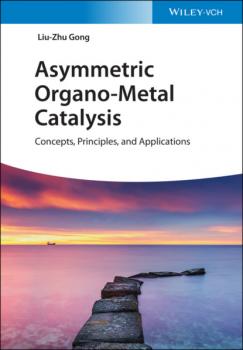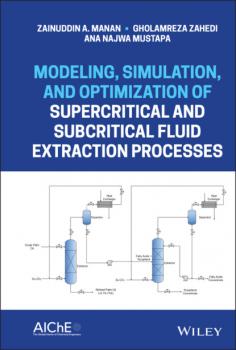ТОП просматриваемых книг сайта:
Химия
Различные книги в жанре Химия, доступные для чтения и скачиванияModeling, Simulation, and Optimization of Supercritical and Subcritical Fluid Extraction Processes - Zainuddin A. Manan
Аннотация
This book provides a complete guide on tools and techniques for modeling of supercritical and subcritical fluid extraction (SSFE) processes and phenomena. It provides details for SSFE from managing the experiments to modeling and optimization. It includes the fundamentals of SSFE as well as the necessary experimental techniques to validate the models. The optimization section includes the use of process simulators, conventional optimization techniques and state-of-the-art genetic algorithm methods. Numerous practical examples and case studies on the application of the modeling and optimization techniques on the SSFE processes are also provided. Detailed thermodynamic modeling with and without co-solvent and non equilibrium system modeling is another feature of the book.
Аннотация
Discover the power of machine learning in the physical sciences with this one-stop resource from a leading voice in the field Deep Learning for Physical Scientists: Accelerating Research with Machine Learning delivers an insightful analysis of the transformative techniques being used in deep learning within the physical sciences. The book offers readers the ability to understand, select, and apply the best deep learning techniques for their individual research problem and interpret the outcome. Designed to teach researchers to think in useful new ways about how to achieve results in their research, the book provides scientists with new avenues to attack problems and avoid common pitfalls and problems. Practical case studies and problems are presented, giving readers an opportunity to put what they have learned into practice, with exemplar coding approaches provided to assist the reader. From modelling basics to feed-forward networks, the book offers a broad cross-section of machine learning techniques to improve physical science research. Readers will also enjoy: A thorough introduction to the basic classification and regression with perceptrons An exploration of training algorithms, including back propagation and stochastic gradient descent and the parallelization of training An examination of multi-layer perceptrons for learning from descriptors and de-noising data Discussions of recurrent neural networks for learning from sequences and convolutional neural networks for learning from images A treatment of Bayesian optimization for tuning deep learning architectures Perfect for academic and industrial research professionals in the physical sciences, Deep Learning for Physical Scientists: Accelerating Research with Machine Learning will also earn a place in the libraries of industrial researchers who have access to large amounts of data but have yet to learn the techniques to fully exploit that access. Perfect for academic and industrial research professionals in the physical sciences, Deep Learning for Physical Scientists: Accelerating Research with Machine Learning will also earn a place in the libraries of industrial researchers who have access to large amounts of data but have yet to learn the techniques to fully exploit that access. [/i] This book introduces the reader to the transformative techniques involved in deep learning. A range of methodologies are addressed including: •Basic classification and regression with perceptrons •Training
Аннотация
For the first time, in this book, a new view of metal-organic frameworks (MOFs) has been presented: MOFs with heterogeneous structures. In this field, there are different levels of understanding we need to consider. So, the principal aspects of heterogeneity that produce complexity in MOFs, their effects in the structure chemistry, performance and applications have been thoroughly reported. According to that there is no book that covers whole of the aspects of complexity in MOFs with heterogeneous structures, our findings can be as essential concepts with introducing complexity to design the new platforms of materials with advanced and better properties in the future.










